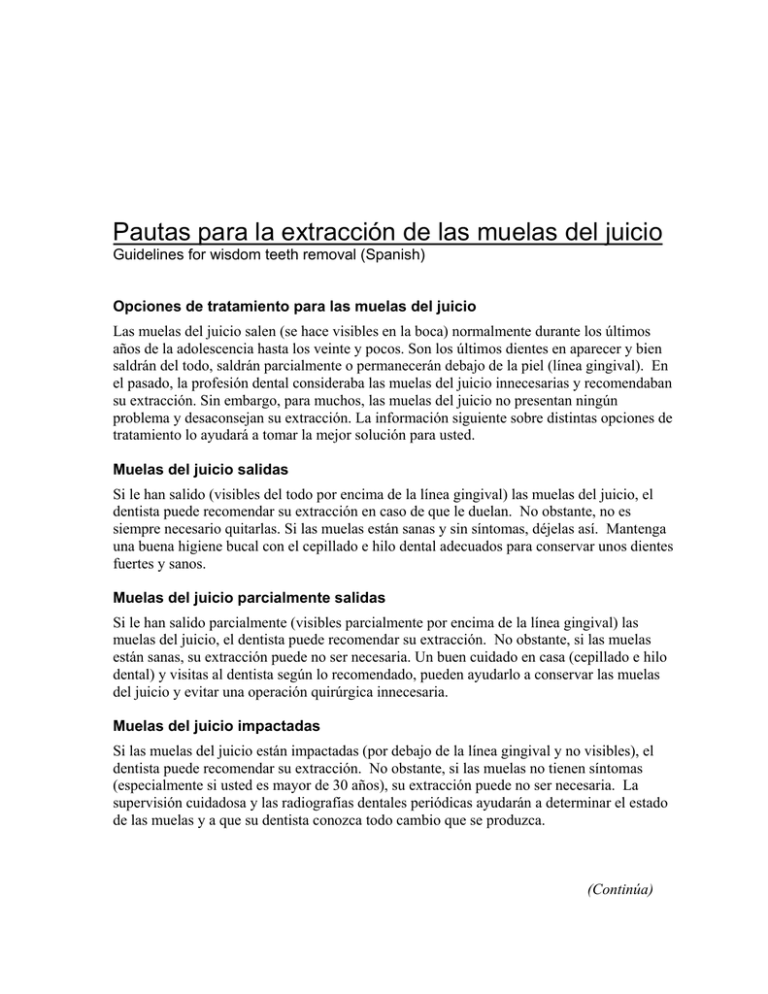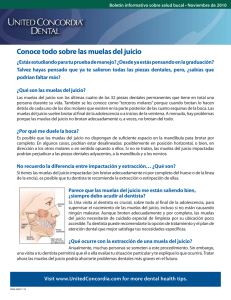Pautas para la extracción de las muelas del juicio
Anuncio

Pautas para la extracción de las muelas del juicio Guidelines for wisdom teeth removal (Spanish) Opciones de tratamiento para las muelas del juicio Las muelas del juicio salen (se hace visibles en la boca) normalmente durante los últimos años de la adolescencia hasta los veinte y pocos. Son los últimos dientes en aparecer y bien saldrán del todo, saldrán parcialmente o permanecerán debajo de la piel (línea gingival). En el pasado, la profesión dental consideraba las muelas del juicio innecesarias y recomendaban su extracción. Sin embargo, para muchos, las muelas del juicio no presentan ningún problema y desaconsejan su extracción. La información siguiente sobre distintas opciones de tratamiento lo ayudará a tomar la mejor solución para usted. Muelas del juicio salidas Si le han salido (visibles del todo por encima de la línea gingival) las muelas del juicio, el dentista puede recomendar su extracción en caso de que le duelan. No obstante, no es siempre necesario quitarlas. Si las muelas están sanas y sin síntomas, déjelas así. Mantenga una buena higiene bucal con el cepillado e hilo dental adecuados para conservar unos dientes fuertes y sanos. Muelas del juicio parcialmente salidas Si le han salido parcialmente (visibles parcialmente por encima de la línea gingival) las muelas del juicio, el dentista puede recomendar su extracción. No obstante, si las muelas están sanas, su extracción puede no ser necesaria. Un buen cuidado en casa (cepillado e hilo dental) y visitas al dentista según lo recomendado, pueden ayudarlo a conservar las muelas del juicio y evitar una operación quirúrgica innecesaria. Muelas del juicio impactadas Si las muelas del juicio están impactadas (por debajo de la línea gingival y no visibles), el dentista puede recomendar su extracción. No obstante, si las muelas no tienen síntomas (especialmente si usted es mayor de 30 años), su extracción puede no ser necesaria. La supervisión cuidadosa y las radiografías dentales periódicas ayudarán a determinar el estado de las muelas y a que su dentista conozca todo cambio que se produzca. (Continúa) Extracción de las muelas del juicio Si experimenta alguna de las afecciones siguientes, es probable que el dentista recomiende la extracción de las muelas del juicio: • • • • Mucha caries Enfermedad periodontal (encías) Infección Quistes Es importante cepillarse y usar hilo dental regularmente. Mantener los dientes sanos puede ayudar a prevenir la caries, la enfermedad periodontal y las infecciones. Asegúrese de tratar todas las opciones de tratamiento con el dentista y el equipo de atención dental. © 2001-7 HealthPartners 10-07/X/052080 Guidelines for wisdom teeth removal Treatment options for wisdom teeth Wisdom teeth generally erupt (become visible in the mouth) during your late teenage years to early 20s. They are the last teeth to appear and will either fully erupt, partially erupt or remain underneath the skin (gum line). In the past, the dental profession viewed wisdom teeth as unnecessary and would recommend that these teeth be pulled. Yet, for many, wisdom teeth are problem-free and don’t need extraction. The following information on treatment options will help you decide what’s best for you. Erupted wisdom teeth If your wisdom teeth are erupted (fully visible above the gum line), your dentist may recommend removing them if they are causing you pain. However, removing erupted wisdom teeth is not always necessary. If your teeth are healthy and symptom-free, keep them that way. Practice good oral hygiene with proper brushing and flossing to maintain strong, healthy teeth. Partially erupted wisdom teeth If your wisdom teeth are partially erupted (partly visible above the gum line), your dentist may recommend that you have them removed. However, if your teeth are healthy, removal may not be necessary. Good home care (brushing and flossing) and visiting your dentist as prescribed can help maintain your wisdom teeth and avoid unnecessary surgery. Impacted wisdom teeth If your wisdom teeth are impacted (beneath the gum line and not visible), your dentist may recommend pulling them. However, if your teeth are symptom-free (especially if you’re age 30 and above), removal may not be necessary. Careful monitoring and periodic dental X-rays will help determine the condition of your teeth and alert your dentist to any changes. Removing wisdom teeth If you are experiencing any of the following conditions, your dentist is likely to recommend that you have your wisdom teeth removed: • • • • Extensive tooth decay Periodontal (gum) disease Infection Cysts It’s important to brush and floss your teeth regularly. Keeping your teeth healthy can help prevent tooth decay, periodontal disease and infection. Be sure to discuss all your treatment options with your dentist and dental care team. © 2001-7 HealthPartners 10-07/X/109891
